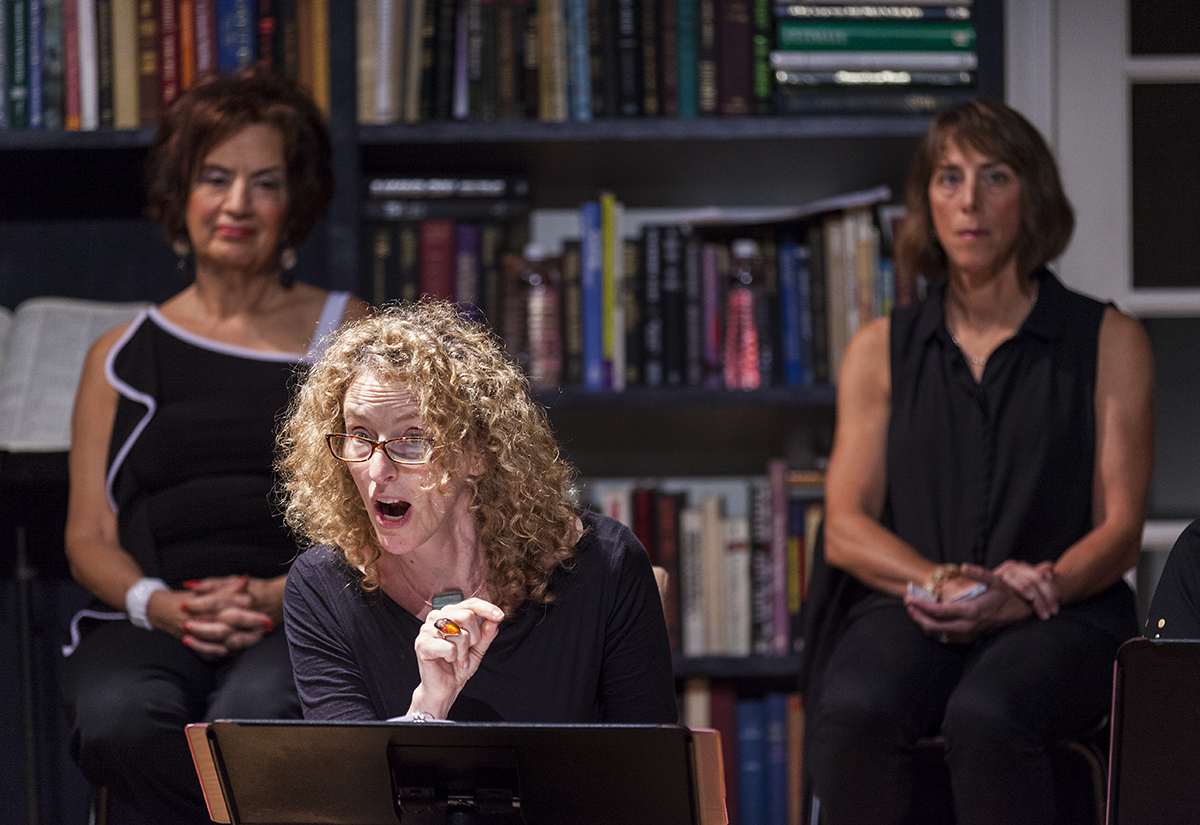Thursday marks the end of an era for the Chautauqua Theater Company. It is Vivienne Benesch’s last day as co-artistic director.
“I drive away at 6 a.m. on July 29, so it’s an emotional day,” Benesch said.
She will be returning to North Carolina, where since Jan. 1 she has served as the producing artistic director of PlayMakers Repertory Company, the University of North Carolina at Chapel Hill’s professional theater in residence.
Before she leaves, at 9:15 a.m. Thursday at the Chautauqua Women’s Club, Benesch will converse about her experience “Coming of Age as an Artist at Chautauqua,” as part of the CWC’s Chautauqua Speaks series.
“I am very, very privileged to have come from a massively artistic family on both sides,” she said.
Her mother and grandmother were dancers, and her other grandmother was a concert pianist. One of Benesch’s grandfathers was a museum curator and the other was an architect and interior designer. Her father was in finance.
She said that although she desperately wanted to be a dancer, she’s flat-footed. Nevertheless, she could not recall a time when she thought she wasn’t going to be in the arts. Increasingly, she has become aware of what a privilege it is to have been able to pursue fine and performing arts.
Benesch studied theater and religious studies at Brown University, and earned her master of fine arts in acting at New York University under the guidance of Zelda Fichandler, a pioneer of the regional theater movement. She has performed at renowned resident theaters and on Broadway, as well as in feature films, including “American Splendor,” and on television (“The Good Wife” and “Law & Order”).
“I’ll talk about my tenure here, my 12 years as artistic director and 27 at Chautauqua,” Benesch said. “I started here when I was 21, as a student. I came back as home room teacher for the high school conservatory, then guest teacher and director, then with Ethan McSweeny as artistic director. Rebecca Guy is a lifelong mentor.”
Guy was artistic director of the CTC from 1987 to 2004 and Benesch’s high school acting teacher.
Benesch said she will also talk about how she’s changed as an artist, how Chautauqua has changed and grown since 1989 and what her aspirations are for the CTC.
“I hope that I’ve at least laid the groundwork for Andrew Borba,” she said.
That Chautauqua’s inter-arts collaborative work is taking off — not just on the large scale performed in the Amphitheater, but also on a smaller, student-initiated level — is what Benesch is proudest of having achieved. She said she is also proud of the CTC’s New Play Workshop, which has opened up the Institution to people who might otherwise regard it as a closed, gated place.
“Chautauqua is an incredible gift for artists,” she said. “We’re in this incredible place with so much to offer, but we’re inevitably sequestered doing the things we do.”
Each year Benesch’s greatest challenge has been “how to take care of the theater company financially, spiritually and artistically.” In and of itself, tending to the needs of all of the CTC’s artists has been a significant challenge.
“I’m insanely proud of the work I do here, the educational experience and how we have diversified the company, but there’s more to do,” she said.
According to Benesch, her political development has been part of her evolution. She has learned here that you cannot separate activism and art.
“I feel a mark of my tenure is aiming toward women’s voices — playwrights and actors,” Benesch said.
Because the CTC performs a Shakespeare play each year, typically there have been nine men and five women in its conservatory. This year, however, there are nine women and five men because in this production of The Taming of the Shrew, there is role swapping.
For Benesch, In the Next Room is about women finding their voice and body.
“I’m really trying to look at giving voice to women,” she said.
The Profane — the third play the CTC and the Chautauqua Writers’ Center have commissioned — deals with male consciousness, especially with respect to cultural traditions, tolerance and women’s roles.
Six of the CTC’s eight scenic staff are women. Benesch said that each set is built from scratch; none are brought in from other productions.
During the course of the summer, about 120 staff are needed for the CTC’s plays and many special events.
There are currently two artistic directors, a managing director, senior staff (overseeing the company, production, stage, and marketing), actors, guest artists, directors, New Play Workshop playwrights, designers, conservatory directing and design fellows, faculty, four levels of stage managers, three levels of production managers, scenic staff, costumers, four levels of prop staff, electricians, sound and lighting technicians, two levels of house managers responsible for patron services, and several administrators (company management, media and design, marketing and communications).
Benesch said she has been asking herself questions such as: “What does it mean to be an actor or a designer today? For all elements of our company, what’s our relationship to something more global?”
She also said she hopes she inspires a sense of the dual responsibility between artists and audience members.
“How is it that the Chautauqua audience has made its artists who they are?” she said. “As artists grow and change, are audience members also growing and changing? What is the role of audience members in developing their cultural foundation?”
At Chautauqua, Benesch has had year-round friendships and seasonal relationships with the audience and community. She said PlayMakers Repertory Company is her opportunity to have a year-round relationship with the audience and community.
“It was time for me to build something in a more permanent, long-term way,” Benesch said. “It’s all a little like I’m starting a long-term relationship versus fabulous summer affairs.”
In mid-August, she will return to Chautauqua in time for the Bratton Late Night Cabaret and the closing of The Taming of the Shrew.
“I know I’ll be back directing and possibly acting again,” Benesch said. “I thought I might be able to do both jobs at once, but I cannot.”





